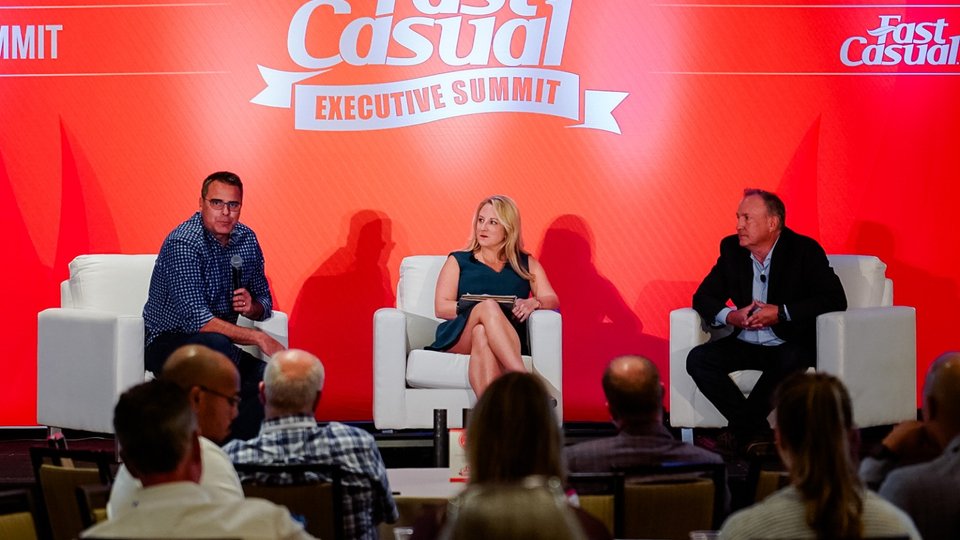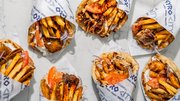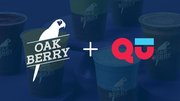Fast Casual Executive Summit
Panera Bread execs: We're not afraid of taking risks
Eduardo Luz, chief brand and concept officer, and Rob Sopkin, SVP, chief development officer, at Panera Bread, shared the keynote at the Fast Casual Executive Summit that kicked off Sunday night. The leaders spoke about growing off-premise business while enhancing the on-premise guest experience at the annual event hosted by Networld Media Group.

October 4, 2021 by Mandy Wolf Detwiler — Editor, Networld Media Group
Panera Bread is not afraid to take risks and innovate. That's the takeaway from a keynote address led by Eduardo Luz, chief brand and concept officer at Panera Bread, and Rob Sopkin, senior vice president and chief development officer at Panera Bread. The two leaders kicked off the Fast Casual Executive Summit in a keynote titled "Growing Your Off-Premise Business While Enhancing Your On-Premise Guest Experience" sponsored by 7shifts.
The summit is underway in Charlotte, North Carolina and one of several foodservice and technology industry events run by Networld Media Group. A virtual event, #QSRNext, will take place Nov. 9.
Luz and Sopkin said the brand has worked to balance digital ordering off-site while enhancing the on-premise customer experience. Panera 2.0, which rolled out a few years ago, shifted the company's focus to digital and kiosk ordering, which has been embraced by consumers in light of the pandemic. That shift to digital has changed the way Americans consume goods, and that change is here to stay.
"We believe that the company has a DNA that runs deep and is centered on innovation," Luz said. "We are not afraid of taking risks, going first, the way that we did with 2.0."
Sopkin said more customers are utilizing rapid pick-up, adding that concepts like Chipotle, also an industry leader, is innovating the way customers interact with the brand.
"How can we become more convenient to our guests?" Sopkins asked, adding that is still a focus for the company despite the shift toward technology. The company's next-generation design will have a traditional drive-thru but also a second lane for those who order ahead.
"For the customer," Sopkin said, "it's really ... however you want to enjoy Panera, we're here to meet your needs."
Next-gen operations
With the new "next-gen" Panera Bread design, whereas a typical store weighed in at 4,300 square feet, the next-gen stores are 3,500 square feet, acknowledging that more customers are opting to receive their orders via rapid pick-up. That reduces the number of seats from around 120 to 60-80.
"If you choose to come in, and we think that occasion still exists … we really need to enhance that experience," Sopkin said.
Luz said the company's app has been a big driver of online ordering and has lead the charge for Panera 2.0.
"Guests are going to communicate more with us like we communicate with our own friends," he said. "That type of very relatable, very intuitive way to communicate with us is where our solutions are going."
Panera Bread has one of the largest loyalty programs in the restaurant industry, weighing in at 40 million members after 11 years and was one of the first of its kind. "We connect with our guests in a way that is more than just transactional," Luz said.
The new concept allows a customer to order, pay and receive food at the table without coming into contact with a team member. The customer receives a text when the food is ready. So how does Panera Bread intend to interact with this new kind of customer?
"Companies that are figuring it our are learning how to be intuitive," said Sopkin. "I think we want to personalize that experience. The system should feel integrated no matter how you're ordering. All that feels like it's from the same DNA."
One way the company is integrating its concept is by bringing forth the bakery. In new Panera Breads, the bakery is at the forefront of the design and the bakers take center stage.
"Bakery theater is the centerpiece experience for the guest," Luz said.
That gives the guest the best of both worlds, he said, in that customers experience the technological advances Panera Bread has taken over the past few years coupled with the old-school service aspect of the restaurant industry.
New era challenges
When asked what challenges the brand faces, labor and supply-chain issues top the list. "Without a doubt we've felt the crunch," Sopkin said. "It's become more and more competitive."
Panera Bread is attempting to figure out "very compelling value propositions for our associates (and) creating career paths will be imperative to attracting top talent," Sopkin said.
It's more than just wage rate, he said, to also include training.
"What we're hearing from our associates is they want a career path. They want to work for a company that they believe in," Sopkin added. "They want to be appropriately trained. All of that is pretty substantial heavy lifting to get it back to where it needs to be and that's how we're viewing that going forward. Those that are able to create those compelling stories are ultimately going to be able to attract the labor that they want. We fundamentally believe that the experience of the consumer is never going to exceed the experience of the associate. How you treat you people is going to be clear to your customers and if you treat your associates the right way, they in turn treat your customers the way you want your customers to be treated, and that's really our paradigm and the what we think is really important."
Weighing the future
Going forward, off-premise sales are going to become more important as brands shift with the changing times. The goal, after all, is to meet the customer where they want to be met, Luz said.
The challenge is understanding what the brand is all about and learning how the customer is interfacing with the brand. The level of competition for dine-in is growing, but the same customer is using different channels: third-party delivery, dine-in and pick-up. The challenge is appealing to all aspects of customers' expectations.
"The totally contactless ordering is important to us," Luz said. "Having said that, the human interaction is also important to us. It's not one way or the other. It's both."
About Mandy Wolf Detwiler
Mandy Wolf Detwiler is the managing editor at Networld Media Group and the site editor for PizzaMarketplace.com and QSRweb.com. She has more than 20 years’ experience covering food, people and places.
An award-winning print journalist, Mandy brings more than 20 years’ experience to Networld Media Group. She has spent nearly two decades covering the pizza industry, from independent pizzerias to multi-unit chains and every size business in between. Mandy has been featured on the Food Network and has won numerous awards for her coverage of the restaurant industry. She has an insatiable appetite for learning, and can tell you where to find the best slices in the country after spending 15 years traveling and eating pizza for a living.












